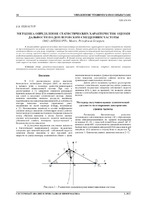Методика определения статистических характеристик оценки дальности по доплеровским смещениям частоты
Another Title
Method for determining of statistical characteristics of evaluated distance obtained from measurements of doppler frequency offsets
Bibliographic entry
Легкоступ, В. В. Методика определения статистических характеристик оценки дальности по доплеровским смещениям частоты = Method for determining of statistical characteristics of evaluated distance obtained from measurements of doppler frequency offsets / В. В. Легкоступ // Системный анализ и прикладная информатика. – 2022. – № 1. – С. 20-26.
Abstract
В данной работе приведена методика получения основных статистических характеристик оценки дальности до объекта по двум доплеровским смещениям частоты навигационного сигнала. Данная задача возникает при рассмотрении процесса наведения некоторого объекта на цель вдоль гиперболы с помощью бистатической разностно-дальномерной навигационной системы. Несмотря на то, что контур наведения объекта замкнут по разностно-дальномерной информации, в алгоритм выработки команд управления необходимо вводить дальность между объектом и центром навигационной системы с целью стабилизации частотной характеристики контура управления и компенсации динамической ошибки. В данной статье рассмотрены статистические характеристики оценки дальности, получаемой на основании измерений трех значений скорости объекта: собственной скорости движения и двух проекций этой скорости на линии, соединяющие объект с навигационными позициями.
Abstract in another language
This paper presents a technique for obtaining of the main statistical characteristics of the distance estimation between the flying object and a hyperbolic navigation system using two Doppler frequency shifts of the navigation signal. This problem arises when the guidance of the object at a target point along a hyperbola using a bistatic hyperbolic navigation system is considered. Despite the fact that the object guidance loop is closed according to the time difference of arrival information, it is necessary to enter the distance between the object and the center of the navigation system into the algorithm for generating control commands in order to stabilize the frequency response of the control loop and eliminate dynamic errors. This article discusses the statistical characteristics of the estimated range based on the measurements of three values of the object’s speed: its own speed and two projections of this speed on the lines connecting the object with the navigation positions.
View/
Collections
- № 1[8]

